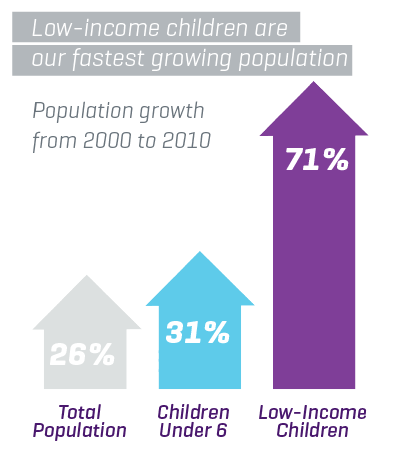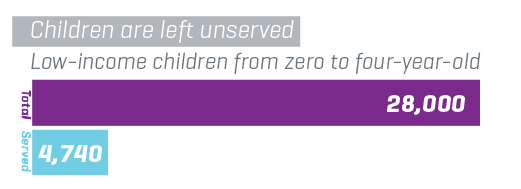 In our community, low-income children are our fastest growing demographic – growing two times faster than in the state, which is twice as fast as the national growth rate.
In our community, low-income children are our fastest growing demographic – growing two times faster than in the state, which is twice as fast as the national growth rate.
Recently, policy proposals from state and national officials have put children in the spotlight, and with growing conversation about how to best serve vulnerable children, our Success By 6 program has compiled some insights on the importance of quality care and different policy suggestions about how to support children and parents.
The Research
We spoke with a panel of experts (Dr. Elizabeth Gershoff, Dr. Aletha Huston and Dr. Elliot Tucker-Drob)from The University of Texas about nationally-recognized research in the area. Here’s what they had to say:
- In Oklahoma and Florida (where universal preschool has been adopted), parents are taking advantage of the opportunity (75 and 76 percent adoption, respectively). However, quality and outcomes vary based on funding – Oklahoma is seeing greater results because of a greater investment.
- Research has shown that preschool provides a $7 return on every dollar invested. Research specifically on Head Start shows early results and then fade-out by first grade. Researchers are working to understand these numbers, but have found that looking at longer-term outcomes – like being employed and staying out of jail versus first grade testing – still show the benefits of Head Start.
- Preschool helps close the achievement gap: research from UT shows that preschool can make up for differences in the home environment and help children be more successful in school. This effect was even more dramatic for low-income children.
- The earlier the service, the greater the return. This is why home visiting and Early Head Start, which focus on the first three years, are critical. Studies on home visiting programs show that empowering mothers with knowledge and tools around healthy habits and child development no only helped them be better parents but also made them more likely to have jobs and escape the cycle of poverty.
President Obama’s Proposal
In February, President Obama announce that early childhood was a priority for his administration in the State of the Union. The President’s proposal features three components:
- Universal Preschool: the plan advocates a cost-sharing partnership between Department of Education and states to create voluntary preschool programs that serve 4-year-olds. These could be either private or public enterprises, and the plan emphasized quality care. The goal is for all parents to be able to access quality child care.
- Home visiting: This program focuses on new parents and 0- to 3-year-olds, working to educate and support parents in the critical first year so they may provide better care.
- Head Start and Early Head Start: The plan would expand these early care and education programs to serve more children and offer a stricter focus on quality.
Representative Strama’s Proposal
Here in Texas, Representative Mark Strama is proposing a cost-effective yet meaningful change in subsidized child care to make high quality care affordable and accessible to more low-income families.
Right now, parents who qualify can receive a subsidy for child care while they work or go to school. Often times, the reimbursement rate is below the market cost of care and leaves child care providers with a funding gap – child care centers must raise the funds to make up the difference, pass that cost on to parents or chose not to serve subsidized children.
Rep. Strama’s proposal ties subsidies to the quality of the center, providing an incentive for centers to achieve higher quality ratings. The bill funds tehse changes by redirecting a small percentage of funding that already comes in from federal programs to provide additional support to parents.

Proposals like these put young children at the center of public policy. As the population of low-income children continues to grow, our continued prosperity as a community and a region depends on a strong education system, including early childhood care and education.
